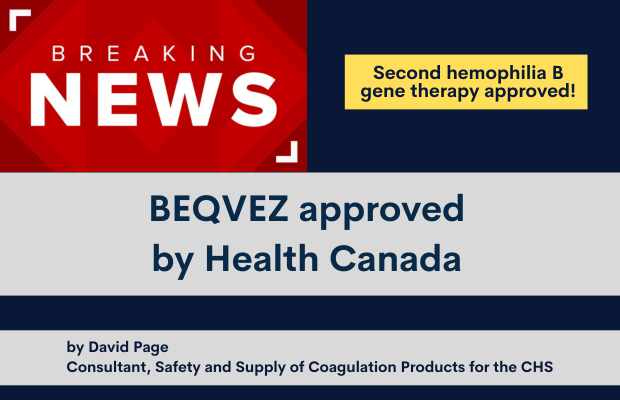Health Canada approves Beqvez gene therapy for hemophilia B

Ottawa – January 3, 2024 – Health Canada has authorized Beqvez (fidanacogene elaparvovec), gene therapy for the treatment of hemophilia B. Beqvez is indicated for the treatment of adults with hemophilia B who require routine prophylaxis to prevent or reduce the frequency of bleeding episodes.
Beqvez is a one-time, single dose treatment from Pfizer Canada. This Notice of Compliance from Health Canada is the first in the world for this therapy. Beqvez is currently being evaluated by the U.S. Food and Drug Administration and the European Medicines Agency.
A second gene therapy for hemophilia B, Hemgenix (etranacogene dezaparvovec), marketed by CSL Behring, was approved by Health Canada in November, 2023 by the U.S. Food and Drug Administration (FDA) in November 2022, and by the European Medicines Agency (EMA) in February 2023.
“The Canadian Hemophilia Society welcomes the approval of Beqvez, the second gene therapy for hemophilia B to receive its Notice of Compliance from Health Canada in recent months,” said Wendy Quinn, CHS President. “Our hope is that gene therapy will be made available to those who are eligible and have made an informed decision to proceed. We are committed to ensuring education and support for our community as gene therapies have the potential to fundamentally transform treatment and improve quality of life for some individuals. The CHS will work closely with health authorities in the provinces and territories to ensure that gene therapies for hemophilia B become accessible to eligible patients across Canada as soon as possible.”
Phase 3 clinical trial results reported at the meeting of the International Society of Thrombosis and Hemostasis in Montreal in June 2023 (see reference) provided these data on the safety and efficacy of Beqvez:
- The mean (average) factor IX expression level 15 months after gene therapy administration was 27.5%.
- All 45 patients responded to the therapy with an increase in FIX expression.
- 36 of the 45 patients (81%) in the trial had FIX levels between 5% and 150% at Month 15.
- 6 of the 45 patients (13%) returned to FIX prophylaxis because of low FIX levels.
- 29 of the 45 patients (64%) had no bleeds after Week 12.
- Overall, the annual bleed rate was reduced by 71% to 0.7 bleeds per year.
- All target joints (defined as more than 3 bleeds in a single joint in 6 months prior to gene therapy) were resolved by Month 15.
- 28 of the 45 patients (62%) required corticosteroids to counteract the immune reaction to the therapy; the average course of corticosteroids was 107 days.
- Beqvez was generally well tolerated.
This Notice of Compliance from Health Canada allowing the marketing of Beqvez in Canada is only the first step on the road to patient access. The next stage is the health technology assessment (HTA). For Québec, this is performed by the Institut national d’excellence en santé et en services sociaux (INESSS), and for the rest of Canada by the Canadian Agency for Drugs and Technologies in Health (CADTH). These agencies produce recommendations to their respective provincial and territorial governments on the cost-effectiveness of a new drug in comparison with current therapies. CADTH and INESSS can recommend introducing the drug, not introducing it, or introducing it with conditions, for example, significant reductions on the list price. These recommendations are expected early in 2024. The Canadian Hemophilia Society has made submissions to CADTH and INESSS on both gene therapies.
Gene therapy for hemophilia B is not being reviewed in the same way as previous coagulation products, that is, through the Canadian Blood Services/CADTH process for plasma proteins and related products. For the first time ever in the field of hemophilia, gene therapy (if reimbursed) would not be added to the CBS drug formulary, but rather to each province’s own formulary. The formulary pathway in Quebec remains undecided.
Instead, gene therapies for hemophilia B will proceed to the third stage on the long road to accessibility: price negotiations between the governments and the manufacturers. These are conducted by the pan-Canadian Pricing Alliance (pCPA) on behalf of the federal, provincial and territorial governments. There is no set time frame for these negotiations.
Finally, the last stage is the decision, or rather decisions. It will be up to each government to decide whether or not to add these gene therapies to its formulary. This means that there could be different decisions in different provinces, and unequitable access across the country. Again, decisions by governments can be quick or very long, and are unpredictable.
For more information on hemophilia gene therapy, see the Canadian Hemophilia Society Gene Therapy Education Program at www.hemophilia.ca/gene-therapy.
Reference
Cuker A, Alzahrani H, Astermark J, et al. Efficacy and safety of fidanacogene elaparvovec in adults with moderately severe or severe hemophilia B: results from the phase 3 BENEGENE-2 gene therapy trial. ISTH 2023 Congress; June 24-28, 2023. Abstract OC 52.3.




